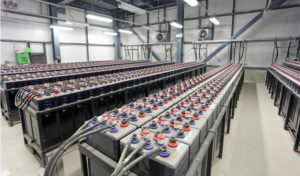Researchers at RMIT University in Melbourne have created a rechargeable “proton battery,” that could change the way energy is stored. The big advantage of the proton battery over today’s battery technologies using lithium, is the affordability and environmental safety of its components. TechXplore reports:
The working prototype proton battery uses a carbon electrode as a hydrogen store, coupled with a reversible fuel cell to produce electricity.
It’s the carbon electrode plus protons from water that give the proton battery it’s environmental, energy and potential economic edge, says lead researcher Professor John Andrews.
“Our latest advance is a crucial step towards cheap, sustainable proton batteries that can help meet our future energy needs without further damaging our already fragile environment,” Andrews said.
“As the world moves towards inherently-variable renewable energy to reduce greenhouse emissions and tackle climate change, requirements for electrical energy storage will be gargantuan.
“The proton battery is one among many potential contributors towards meeting this enormous demand for energy storage. Powering batteries with protons has the potential to be more economical than using lithium ions, which are made from scare resources.
“Carbon, which is the primary resource used in our proton battery, is abundant and cheap compared to both metal hydrogen-storage alloys, and the lithium needed for rechargeable lithium ion batteries.”
During charging, the carbon in the electrode bonds with protons generated by splitting water with the help of electrons from the power supply. The protons are released again and pass back through the reversible fuel cell to form water with oxygen from air to generate power. Unlike fossil fuels, the carbon does not burn or cause emissions in the process.
Read more here.

